Theory of Change Research
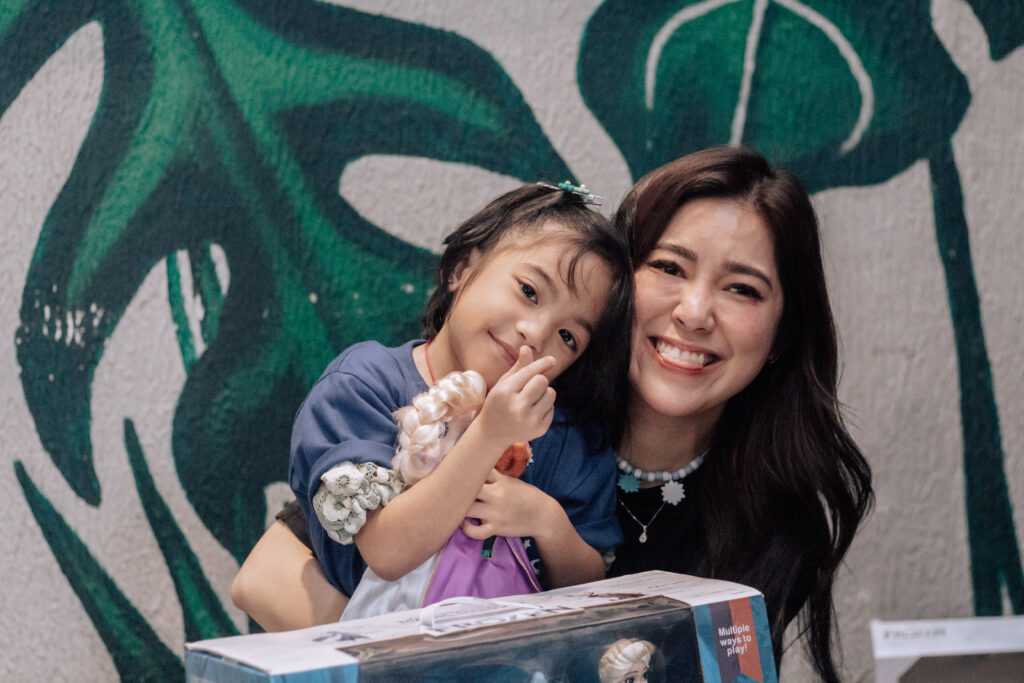
Introduction
In 2022, Make-A-Wish International decided to embark on a journey to develop a Global Theory of Change model to identify wish-granting outcomes that are universal at an Affiliate, regional and global level.
Make-A-Wish mission is rooted in granting the wish of every eligible child facing a critical illness and in prolonging the positive impact of wishes for these children and their families. To do that, we needed first to better understand our beneficiaries’ experiences, particularly wish children and parents/guardians, across Affiliates to create a more consistent and substantiated understanding of the outcomes and impacts that wish granting has had on them.
Make-A-Wish International engaged Research for Impact, a Singapore-based research company, to develop a Theory of Change to help us define and analyse the actual impacts at different stages of the Wish Journey. It shows how these stages affect each other and what needs to be true at each stage to create meaningful change and maximise the impact.
An article based on this research, “Wish-Granting Interventions Promote Positive Emotions in Both the Short and Long Term in Children with Critical Illnesses and Their Families”was published in the peer-reviewed journal Children in 2024.
Above all, we will use this Theory of Change to evaluate and demonstrate that the Wish Journey makes a true difference in the lives of children with critical illnesses and their families, regardless of where they live.
Thank you to Disney and Chiesi Global Rare Diseases for supporting this research project
What is a Theory of Change?
A Theory of Change is a conceptual theoretical model that articulates the causal pathways between a programme’s interventions and its desired final outcomes. In practice, a Theory of Change provides an explicit step-by-step description of how intervention activities at different stages contribute to the sequence of short, medium and long-term stakeholder outcomes that ultimately lead to impact and makes clear what underlying assumptions or contextual factors may also influence these outcomes.
Study Overview and Approach
The development of a Global Theory of Change model for Make-A-Wish International was undertaken in four steps:
- A literature review of relevant Make-A-Wish policies and materials as well as published work on the outcomes and impact of previous individual wish-granting interventions was carried out. The positive changes related to wish interventions that emerged from the review were collated and classified into seven key outcomes that collectively describe the impact of a wish. These outcomes were then used to inform and design the study.
- A large-scale survey was developed to study the experiences of Make-A-Wish beneficiaries to understand the impact of wish-granting globally across Make-A-Wish Affiliates. A finalised survey for both children and parents/guardians was issued to wish families with children aged 13 to 17 years of age in 2023 who had received their wish in the last five years. 832 complete responses were received from wish children and 1,479 from wish parents/guardians were collected and analysed.
- The findings were synthesized into a Global Theory of Change.
- Findings were validated through individual stakeholder interviews.
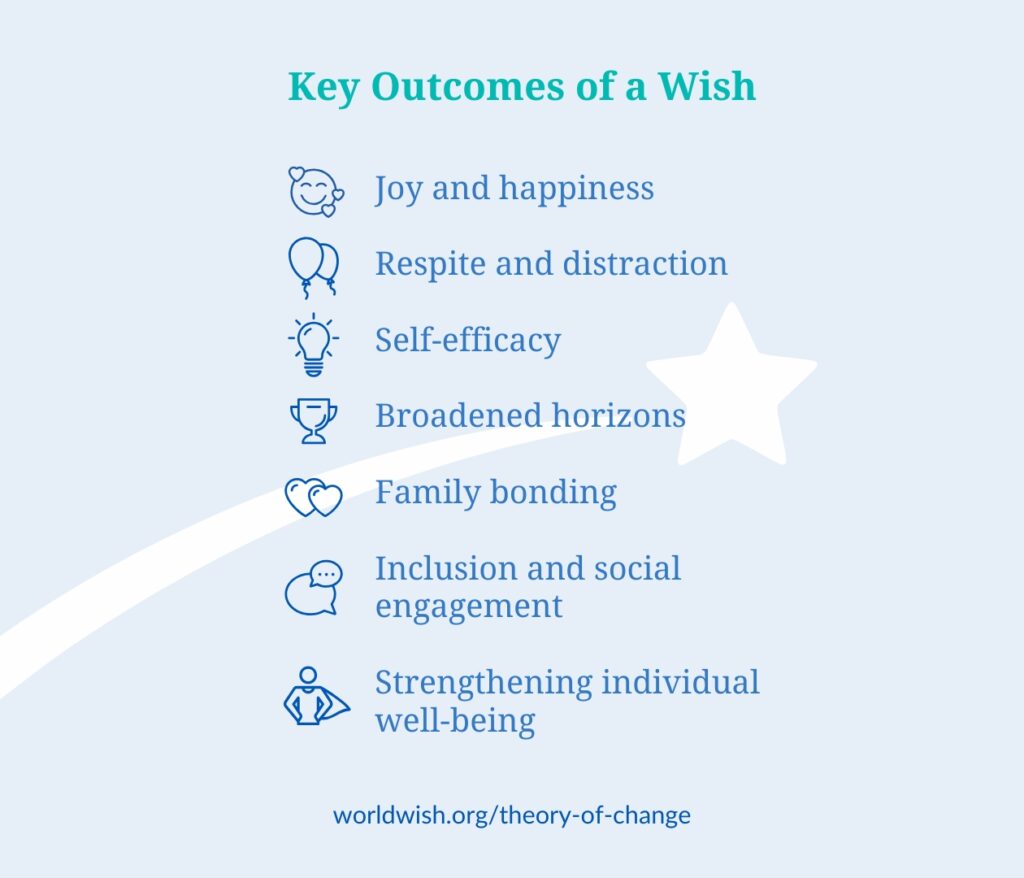
Global Wish Impact
Across all phases of the Wish Journey, Joy and Happiness consistently scored the highest among all types of impact, while the wish realisation phase was the moment that both children and parents expressed having the most positive experience during the Wish Journey. Throughout the Wish Journey the positive experience across all types of impact increases, with the peak happening at the wish realisation phase.
Some highlights of findings were:
- 92% of wish children said the wish experience improved their well-being with 90% saying it helped them look forward and broaden their horizons.
- 97% of both parents and children said it brought them joy and happiness.
- 93% of wish parents said the wish experience provided family bonding.
- 90% of parents said the wish provided respite and distraction for their child.
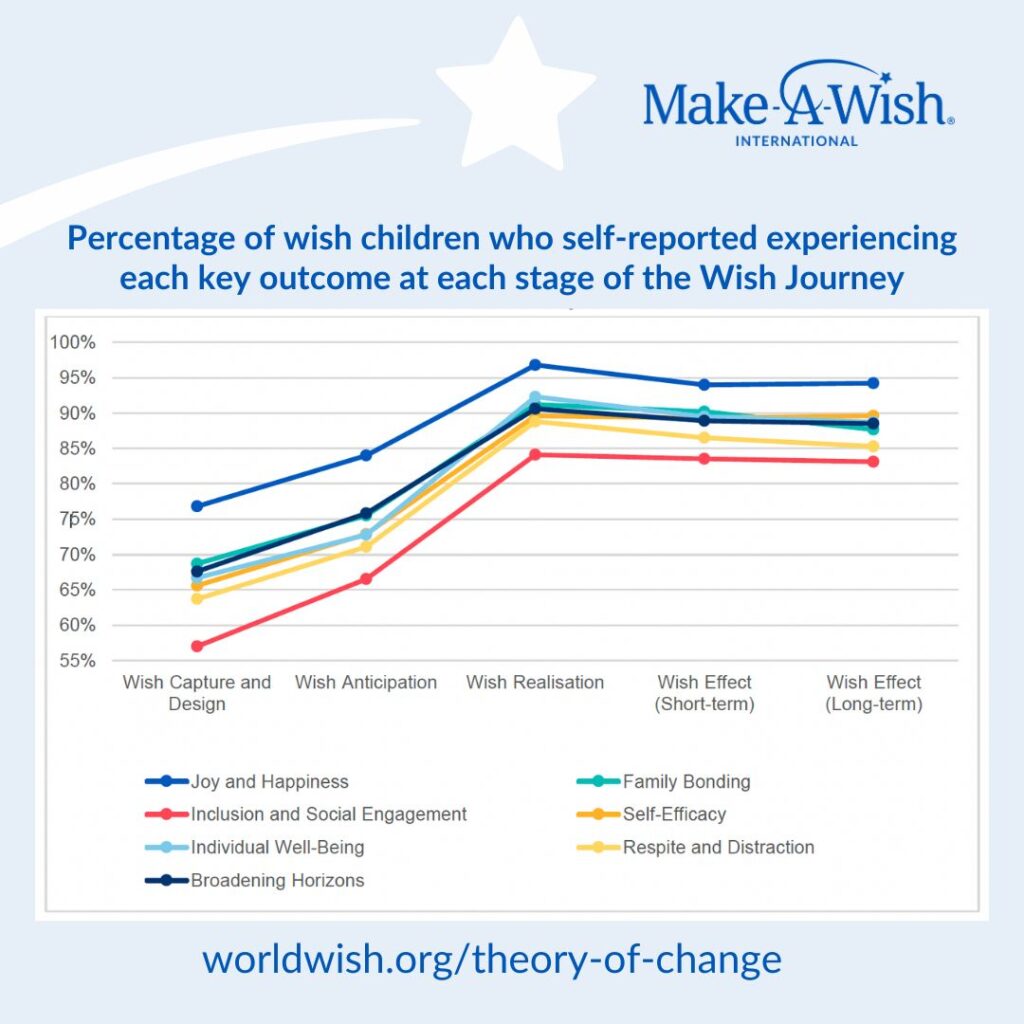
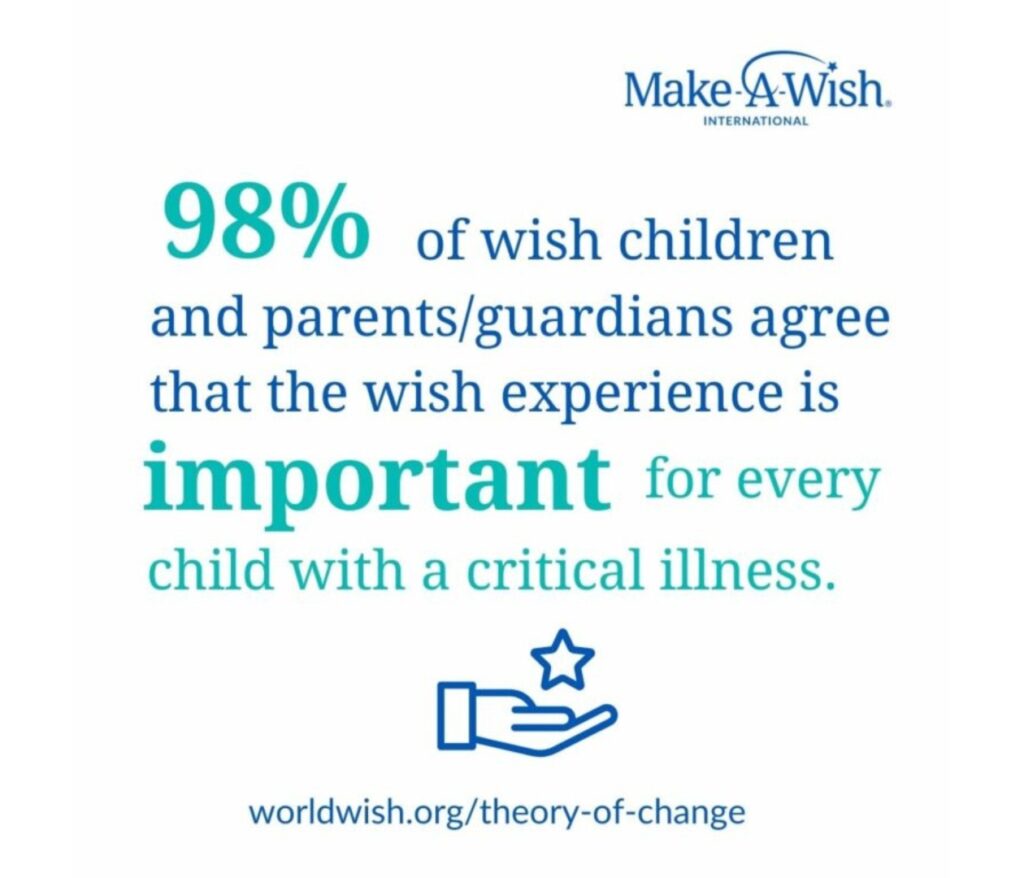
Wish families were surveyed on how important they feel the wish experience, brought to life through the Wish Journey, is:
- 98% of wish children and parents / guardians deemed having a wish experience important for every child with a critical illness.
- 98% of wish children and parents / guardians indicated that they would recommend Make-A-Wish to other children and families in a similar situation.
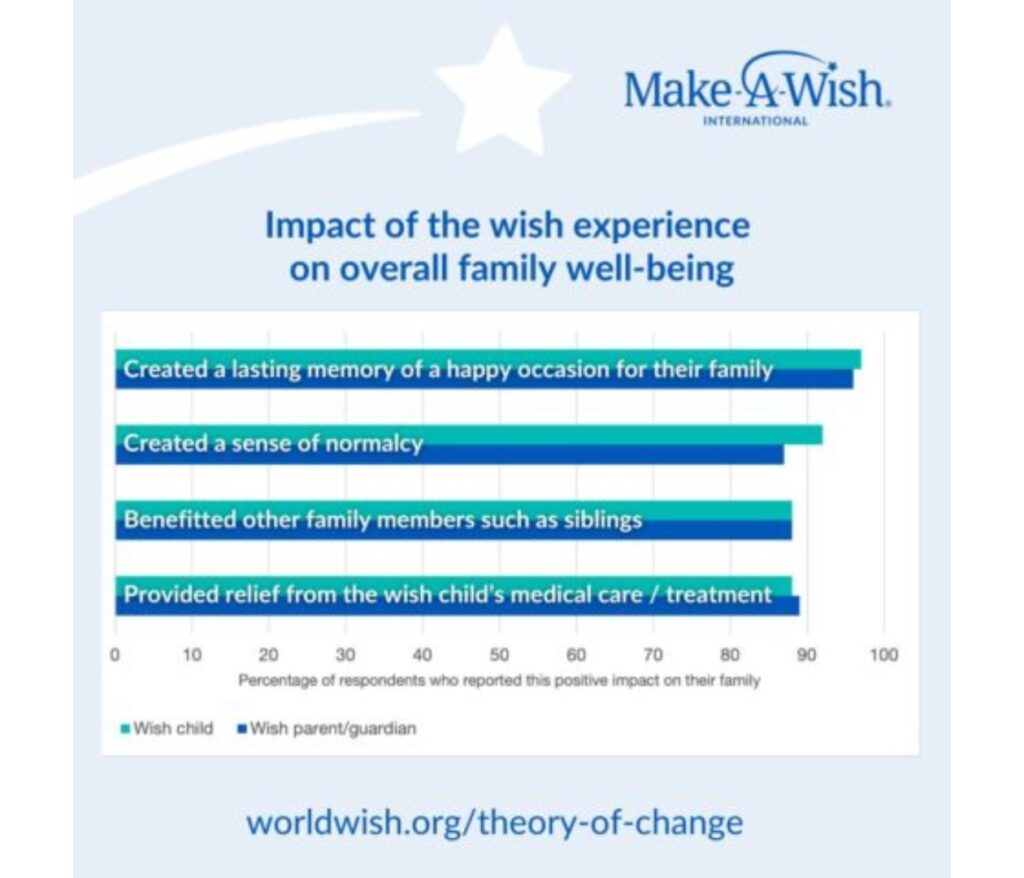
Wish families were also asked about impact on overall family well-being:
- 88% of wish children said the wish experience helped to create a sense of normalcy and provide relief from their medical treatments.
- 96% of parents/guardians said the wish experience created a happy lasting memory for the family and 89% said it created a sense of normalcy.
- 96% of parents/guardians said that thanks to the wish experience they felt empowered to address their child’s social and emotional needs, as well as the child’s medical needs (92%).
Validated Outcomes
Globally, there is a strong convergence around common outcomes and the Wish Journey:
- The benefits of a wish for a wish child included improved physical, emotional, and social well-being and inspiration of hope and optimism.
- A wish experience has a positive impact on the physical, mental and emotional well-being of parents/guardians.
- The wish experience has positive impacts on families by creating happy lasting memories, benefitting other family members (e.g. siblings) and giving themselves/their child relief from medical treatments and creating a sense of normalcy.
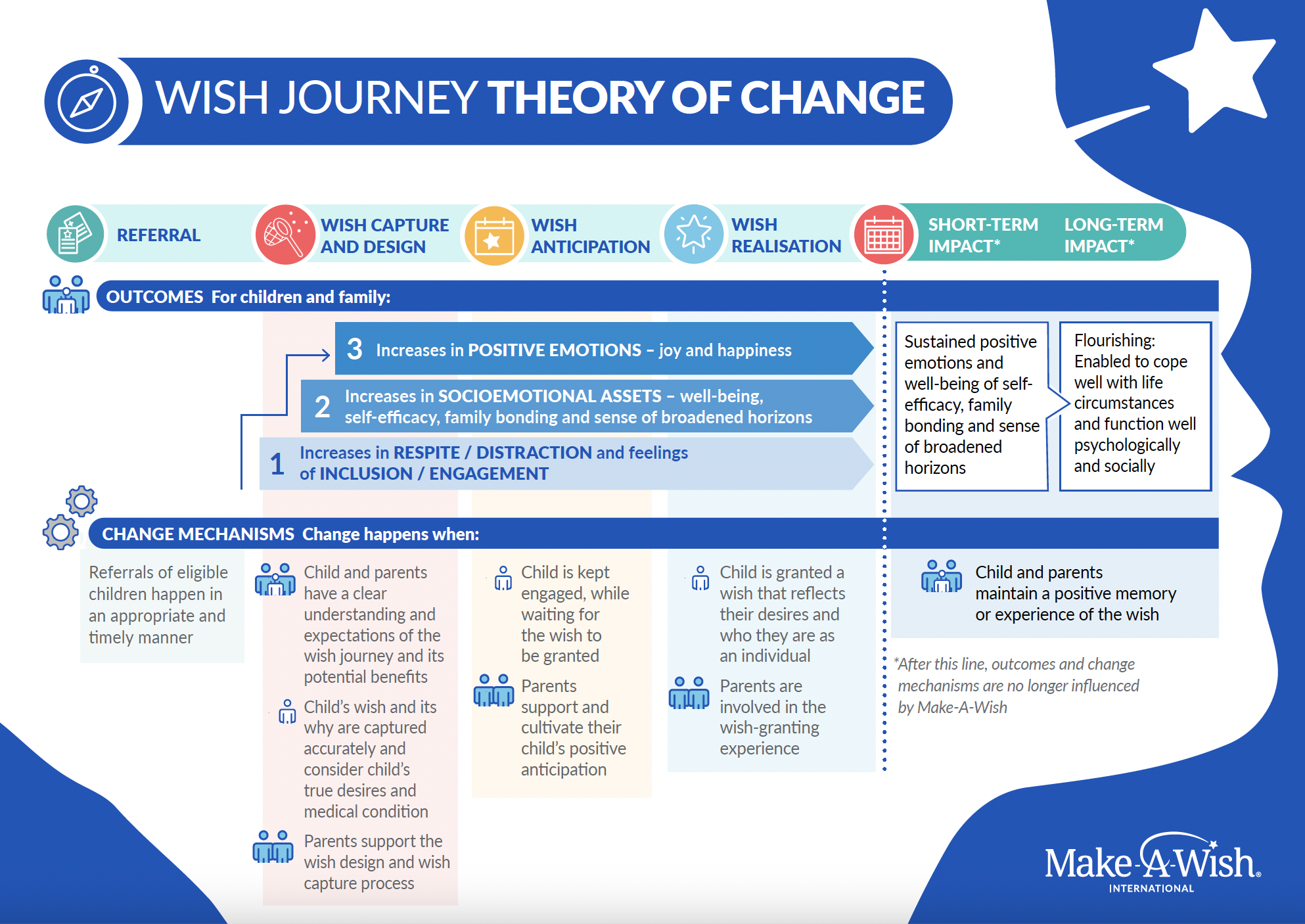
Contextual Factors
- Resources (i.e. funding, manpower), health systems, and wish-granting capacity can vary across and within Make-A-Wish Affiliates.
- Delays in the Wish Journey experience may occur due to factors beyond Make-A-Wish control at various levels, including child (e.g. changes/deteriorations in the child’s health status, ongoing treatment plans), family (e.g. changes in family circumstances), operational (e.g. wish-granting partner challenges), and systems (e.g. overburdened health systems causing referral delays).
- This can influence the implementation of wish-granting experiences, the child’s Wish Journey experience, and the types of wishes that can be granted to children.
Key Assumptions
- Every child receives a unique wish and is treated as a unique case with a Wish Journey that is individualised, open, and flexible.
- All children complete the five-phase Wish Journey and move as efficiently as possible across phases.
- The Wish Journey experience is of high quality and contributes to the achievement of desired outcomes and impact.
- All stakeholders involved in the Wish Journey are invested.
